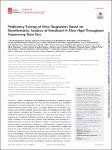Proficiency Testing of Virus Diagnostics Based on Bioinformatics Analysis of Simulated In Silico High-Throughput Sequencing Data Sets
Brinkmann, Annika
Andrusch, Andreas
Belka, Ariane
Wylezich, Claudia
Höper, Dirk
Pohlmann, Anne
Nordahl Petersen, Thomas
Lucas, Pierrick
Blanchard, Yannick
Papa, Anna
Melidou, Angeliki
Oude Munnink, Bas B.
Matthijnssens, Jelle
Deboutte, Ward
Ellis, Richard J.
Hansmann, Florian
Baumgärtner, Wolfgang
van der Vries, Erhard
Osterhaus, Albert
Camma, Cesare
Mangone, Iolanda
Lorusso, Alessio
Marcacci, Maurilia
Nunes, Alexandra
Pinto, Miguel
Borges, Vítor
Kroneman, Annelies
Schmitz, Dennis
Corman, Victor Max
Drosten, Christian
Jones, Terry C.
Hendriksen, Rene S.
Aarestrup, Frank M.
Koopmans, Marion
Beer, Martin
Nitsche, Andreas
Quality management and independent assessment of high-throughput sequencing-based virus diagnostics have not yet been established as a mandatory approach for ensuring comparable results. The sensitivity and specificity of viral high-throughput sequence data analysis are highly affected by bioinformatics processing using publicly available and custom tools and databases and thus differ widely between individuals and institutions. Here we present the results of the COMPARE [Collaborative Management Platform for Detection and Analyses of (Re-)emerging and Foodborne Outbreaks in Europe] in silico virus proficiency test. An artificial, simulated in silico data set of Illumina HiSeq sequences was provided to 13 different European institutes for bioinformatics analysis to identify viral pathogens in high-throughput sequence data. Comparison of the participants’ analyses shows that the use of different tools, programs, and databases for bioinformatics analyses can impact the correct identification of viral sequences from a simple data set. The identification of slightly mutated and highly divergent virus genomes has been shown to be most challenging. Furthermore, the interpretation of the results, together with a fictitious case report, by the participants showed that in addition to the bioinformatics analysis, the virological evaluation of the results can be important in clinical settings. External quality assessment and proficiency testing should become an important part of validating high-throughput sequencing-based virus diagnostics and could improve the harmonization, comparability, and reproducibility of results. There is a need for the establishment of international proficiency testing, like that established for conventional laboratory tests such as PCR, for bioinformatics pipelines and the interpretation of such results.

